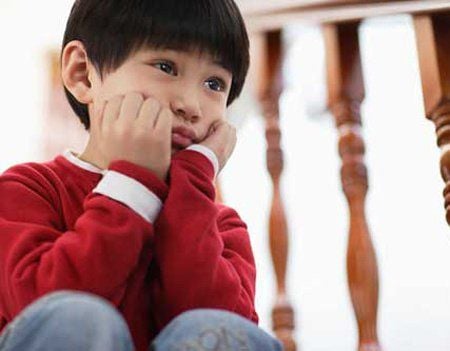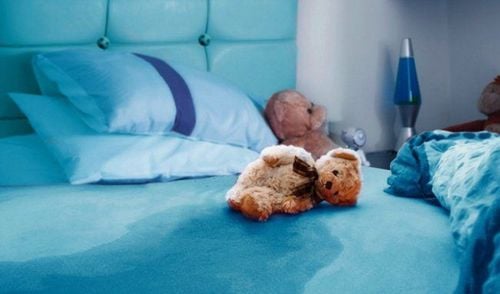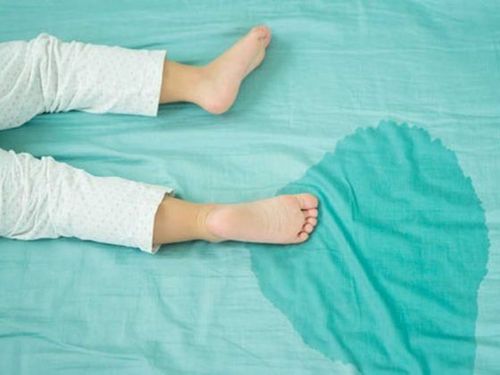This is an automatically translated article.
Expressions of negative emotions have been shown to make bed-wetting in young children worse. So does that mean that negative emotions or stress in children and bedwetting have a connection? The answer is no. Bedwetting is common in young children. Stress and anxiety may not help reduce bed wetting, but it can make bedwetting in children worse.As children grow older, they become more and more self-aware about everything in life, including bed-wetting at night. Children in this age group are faced with many negative emotions, such as feelings of shame and embarrassment for wetting the bed.
During this period, children need encouragement and support from their parents and here are some ways parents can provide emotional support so that children can get through this stage soon. .
1. What to do when children feel ashamed of themselves because they wet the bed?
No matter how often a child's parents reassure their child that wetting the bed is something they can't control and it's not their fault, many of these children may still feel embarrassed or ashamed of themselves. Dear. To address a child's real concerns, parents should be ready to confront and explain to their children some of the following things children often say:If a child says “There is something wrong with me when I constant bed-wetting.” Again, reassure your child that it's completely normal to wet the bed - that some children's bodies take longer to keep them completely dry at night. Emphasize to children that this is not their fault at all, "it's not you, but your body is not developed enough to be able to control this condition well." In particular, genetic factors are also involved. related to children wetting the bed when their parents also wet the bed frequently as a child If the child gets frustrated and says "Maybe you're the only kid who still wets the bed." Give your child some information about According to the American Academy of Pediatrics, about 5 million children in the United States regularly wet their beds, including 10% of 7-year-olds and 5% of 10-year-olds. Put the numbers in context the child can understand. yes: At the age of 7, 1 in 10 kids That means it's possible that there are peers in your child's class, on his or her soccer team, or on his Boy Scouts team. a problem with them If your child feels down "You can't sleep through the night or go camping with your peers because they'll find out you're still bedwetting" Missing out on overnight picnics friends Age to explore the world is a difficult thing for children. Acknowledge your child's concerns and then offer some practical solutions, such as packing disposable underwear and placing it in the bottom of a backpack your child is carrying. It will help your child feel more confident on the field trip If he says "Don't tell anyone you wet the bed!" Assure your child that you won't tell anyone who doesn't need to know, but point out that sometimes it's important to tell other adults who can help - like a child's grandparents if children spend the night at their home. Parents should also remind children that their children's relatives, parents, friends and teachers may know that other children often wet the bed, but they respect it and do not reveal it to anyone.

Khi trẻ dần lớn lên, chúng ngày càng tự ý thức về mọi chuyện trong cuộc sống, trong đó bao gồm cả việc tè dầm vào ban đêm
2. What to do when your child is worried that he or she will be teased for bedwetting?
Being teased and even just scared of being teased about wetting the bed are legitimately common concerns among children. Therefore, parents should have some ways to encourage their children to reduce anxiety and stress about this issue:If the child says: "I'm afraid you guys will make fun of me if they find out I'm still wet on the bed ." Parents should help children find methods to deal with teasing, in case the worst fear that the child does not want comes true. Remind your child that other kids tease them because they want to see them react, so ignoring the tease and walking away can be an effective way to stop teasing. If your child really wants to respond to teasing from her friends, prepare her for some possible scenarios at home. Children find that the more prepared they are, the easier it is to stay calm. Practice can help children feel confident enough to say something real and to the point in their conversation. To a friend, your child might say, "'This happens to a lot of kids. You're nice, so I know you're not going to make fun of me, right?" If another child finds out they're camping with disposable underwear, they might say, "Yes, I wear these because I'm a good night sleeper and sometimes my body just doesn't wake me up. I'm going to the bathroom." And there's always a challenging sentence accompanying it, "So what?"

Bị trêu chọc và thậm chí chỉ là sợ bị trêu chọc về việc làm ướt giường là những mối quan tâm phổ biến chính đáng của trẻ em

Đái dầm là vấn đề phổ biến đối với những trẻ dưới 7 tuổi, thậm chí cho đến khi chúng 10 tuổi
Gathering a team of leading pediatricians: including leading experts with high professional qualifications (professors, associate professors, doctorates, masters), experienced, worked at major hospitals such as Bach Mai, 108.. Doctors All are well-trained, professional, with a mind - range, understanding young psychology. In addition to domestic pediatric specialists, the Department of Pediatrics also has the participation of foreign experts (Japan, Singapore, Australia, USA) who are always pioneers in applying the latest and most effective treatment regimens. . Comprehensive services: In the field of Pediatrics, Vinmec provides a series of continuous medical examination and treatment services from Newborn to Pediatric and Vaccine,... according to international standards to help parents take care of their baby's health from birth to childhood. from birth to adulthood Specialized techniques: Vinmec has successfully deployed many specialized techniques to make the treatment of difficult diseases in Pediatrics more effective: neurosurgery - skull surgery, stem cell transplantation. blood in cancer treatment. Professional care: In addition to understanding children's psychology, Vinmec also pays special attention to the children's play space, helping them to have fun and get used to the hospital's environment, cooperate in treatment, improve the efficiency of medical treatment.
Please dial HOTLINE for more information or register for an appointment HERE. Download MyVinmec app to make appointments faster and to manage your bookings easily.
Article reference source: babycenter.com, chop.edu












